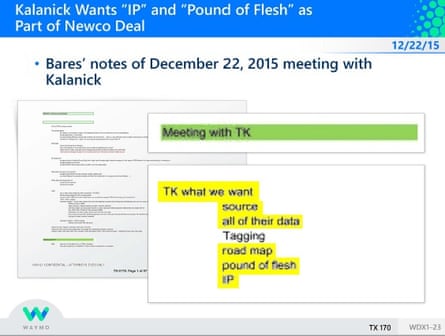A scene from the 1987 movie Wall Street became a flashpoint in the trial in which Google’s driverless car spinoff Waymo accuses the ride-hailing company Uber of stealing trade secrets.
“The point is, ladies and gentlemen, that greed, for lack of a better word, is good,” said the lead character, Gordon Gekko, played by Michael Douglas, in a grainy YouTube video shown on Wednesday to a packed room in San Francisco’s federal court. The former Uber CEO Travis Kalanick watched from the stand, shifting in his seat.
“Greed is right. Greed works. Greed clarifies, cuts through, and captures the essence of the evolutionary spirit. Greed, in all of its forms – greed for life, for money, for love, knowledge – has marked the upward surge of mankind.”
Waymo’s legal team seeks to present Kalanick as a Gekko-like figure for whom “winning was more important than obeying the law”, according to the opening statement of Waymo’s attorney Charles Verhoeven. Uber’s defence paints a different picture: one of Google seeking revenge after its plucky competitor poached its top engineer and started a driverless car programme.
Waymo pushed to play the famous “greed is good” clip because it had been texted to Kalanick in March 2016 by Anthony Levandowski, a senior Waymo engineer whom Uber sought to hire in order to advance its driverless car technology, with the message: “here’s a speech you need to give ;-)”
The jury saw a more subdued Kalanick on the stand, showing none of his trademark bravado. Dressed in a navy suit and tie, Kalanick presented himself as humble and obliging in the face of questioning, taking regular sips from a water bottle. His father, Donald, sat nearby.
Verhoeven’s questions focused on critical emails, meetings and notes relating to Uber’s courting of Levandowski. Kalanick confirmed that Uber’s self-driving car program was lagging years behind Waymo’s and that Levandowski’s particular expertise in Lidar – a critical vision system for self-driving cars – would accelerate its autonomous vehicle efforts.
Kalanick admitted he met with Levandowski in 2015, while Levandowski was still working at Google. During those meetings they discussed Uber’s acquisition of the then non-existent company Otto, which was subsequently launched by Levandowski and acquired by Uber for $590m.
“I wanted to hire Anthony and he wanted to start a company so I tried to come up with a situation where he could feel like he started a company and I could feel like I hired him,” said Kalanick, raising his voice a little for emphasis.
Beyond the “greed is good”, there were many other exchanges shown in court that emphasised Kalanick’s brash business approach, including notes from a meeting in which he wrote what he wanted from the deal with Levandowski, including “IP” and “pound of flesh”. Another internal document, written by a senior Uber executive, noted that Kalanick wanted to use “cheat codes” against competitors and stated: “The golden time is over, it’s war time.”

“That sounds like something I would say,” Kalanick told the court, to a ripple of laughter.
Kalanick’s memory of events around the Otto acquisition was very hazy under questioning by Waymo, and there were a handful of times where what he said on the stand contradicted the words of his deposition in July 2017. His memory became a lot clearer when cross-examined by his own legal team about the relationship between Google and Uber, which he defined as “like big brother and little brother” for many years. Google had invested $258m into Uber in 2013 and Google’s then CEO, Larry Page, had taken Kalanick for a ride in a self-driving car. The companies even talked about a possible partnership under which, in Kalanick’s words, “we do ride-sharing, you do the autonomy thing”.
However, the relationship soured after Uber started its own driverless car programme in 2015. “Larry was fairly upset with us,” Kalanick said.
Asked by Uber’s attorney Karen Dunn why Google might bring a lawsuit, Kalanick said: “Google was generally super not happy … unpumped about us doing this,” he said.
The trial continues.
